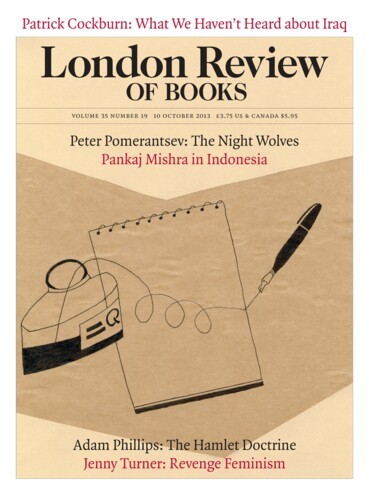On 23 October 2002, between 40 and 50 Chechen men and women drove in a blacked-out van through the early evening central Moscow traffic, out to a suburb once home to one of the world’s largest ball-bearing factories. They pulled balaclavas over their heads, strapped belts of dynamite across their bodies, and walked briskly into the main entrance of a concrete, brutalist theatre known as Palace of Culture Number 10. The show that evening was a performance of Nord-Ost, a musical set in Stalin’s Russia. It was sold out. The terrorists came on stage during a love aria. They fired into the air. At first many in the audience thought they were part of the play. When they realised they weren’t, there were screams and a charge for the exits. But they were blocked by ‘black widows’ with explosives wired between their bodies and the doors. The men on stage ordered the audience back into their seats: if anyone moved they would be shot. By the time I arrived the next morning, as a fixer for tabloid hacks and documentary crews, the theatre was surrounded by soldiers, medics, TV cameras, cops and onlookers.
Peter Pomerantsev
Peter Pomerantsev’s latest book, This Is Not Propaganda, won the 2020 Gordon Burn Prize.
Forms of Delirium: The Night Wolves
Peter Pomerantsev, 10 October 2013
In the Moscow compound of the Night Wolves, the Russian equivalent of the Hells Angels, ships’ conrods have been refashioned as crosses ten feet high. Broken plane parts have been bolted to truck engines to make a giant stage; crushed Harley-Davidsons have been beaten into a bar; boats’ hulls have been moulded into chairs; and train parts into Valhalla-sized tables. The crosses are everywhere, wrenched together out of old bike parts and truck shafts and engines. The Night Wolves, or Nochnye Volki, are bikers who have found a Russian God.
There was much talk of fairy tales in the court-room in Kirov where Alexei Navalny gave his closing statements on Friday. Since leading the failed revolt against Putin’s kingdom of corruption, Navalny has been charged with stealing 16 million rubles worth of Kirov Forest when he was assistant to the local governor in 2009.
Earlier this month the bestselling crime writer Boris Akunin announced that as Russia was becoming a police state with political prisoners, any form of co-operation with the state by cultural and artistic figures was tantamount to collaboration. There has been much agonising since: what about if you work at a state newswire agency? Or at the Bolshoi? It’s an old debate in Russia: there are still fights about whether Shostakovich was collaborating with Stalin or subverting the system from inside. But the challenge is harder now the Kremlin has learnt to speak the language of democratic capitalism, and goes out of its way to own opposition narratives. I once did some consultancy for a hotbed of Russian liberal journalism: Snob.
Egor could clearly see the heights of Creation,where in a blinding abyss frolic non-corporeal, un-piloted, pathless words, free beings, joining and dividing and merging to create beautiful patterns. Vladislav Surkov, Almost ZeroVladislav Surkov, the grand vizier of the Putin era, the creator of ‘managed democracy’ and ‘post-modern dictatorship’, today resigned (was sacked) from the Russian government. I saw him on 1 May when he gave the speech at the LSE that may have been his undoing. There was a small protest at the entrance to the lecture hall calling for him to be included on the list of Russian officials denied visas to the US for their part in the killing of the anti-corruption lawyer Sergei Magnitsky. In a gesture of patriotism Surkov had recently said he would be ‘honoured to be on the Magnitsky list’. Surkov avoided the protest and strode in through the back door. He was wearing a white shirt and a tightly cut leather jacket that was part Joy Division and part 1930s Chekist. He was smiling a Cheshire cat smile. He said that we were too clever an audience to be lectured at and that it would be much freer and more fun if we just threw questions at him. After one vague inquiry he talked for 45 minutes: it was his system of ‘managed democracy’ in miniature – democratic rhetoric and authoritarian practice.
Podcasts & Videos
Peter Pomerantsev, Marina Hyde and Carl Miller: This is Not Propaganda
Peter Pomerantsev
Peter Pomerantsev’s latest book, This is Not Propaganda, travels the world to investigate why we can no longer believe what we say, or say what we believe. He talks about here with Marina Hyde and Carl...
Diary: European Schools
Peter Pomerantsev
Peter Pomerantsev reads his diary about his time in the 'English section' at the European School in Munich.
Diary: Iammmmyookkraaanian
Peter Pomerantsev
Peter Pomerantsev reads his piece on the images and myths of Maidan.
Read anywhere with the London Review of Books app, available now from the App Store for Apple devices, Google Play for Android devices and Amazon for your Kindle Fire.
Sign up to our newsletter
For highlights from the latest issue, our archive and the blog, as well as news, events and exclusive promotions.


